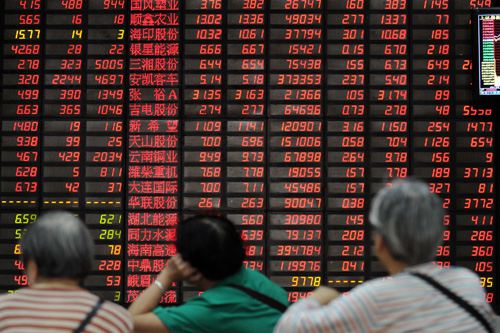|
 |
|
REFORMS COMING: Stock market investors observe a billboard at a securities sales department in Hangzhou, capital of east China's Zhejiang Province Province (JU HUANZONG) |
Two weeks after the Third Plenary Session of the 18th Central Committee of the Communist Party of China (CPC) which promised the boldest reforms in the world's second largest economy, China's securities regulator became the first to dash toward that goal by announcing a market-oriented reform for the stock markets.
The China Securities Regulatory Commission (CSRC) on November 30 released four documents on regulating stock markets, including measures for market-based change in the initial public offering (IPO) issuance mechanism, preferred shares, better protection of investor interests in cash dividends and stricter scrutiny of backdoor listing. The securities watchdog promised to streamline the IPO approval process while strengthening supervision over listed companies.
This is the first time that the CSRC has released such a comprehensive set of policies. The move was felt in the stock markets, as the ChiNext Index, which tracks China's Nasdaq-style board of growth enterprises, nosedived 8.26 percent—the biggest single-day slump since the establishment of the board—on December 2, the first trading day after the new policies were made public. Experts, however, say market-based reform measures will help build more mature stock markets, leading to healthier development of the markets in the long run.
Focal points
The reform of the IPO issuance mechanism has attracted the most attention among all the measures announced by the CSRC, and is seen as a key step in overhauling a lengthy approval process and changing it into a system based on registration.
The CSRC said it will turn China's IPO issuance mechanism from an approval-based system to a registration-based one, in which the market will play a bigger role in judging the risks and value of listed companies. This is in line with decisions made at the Third Plenary Session of the 18th CPC Central Committee, which promised the market a "decisive" role in resource allocation.
"After our audit of the sector, when and how new shares are issued will be under market constraints and will be independently decided, pricing of shares will more closely reflect true levels of supply and demand," the CSRC said in a statement.
China used to adopt the approval-based IPO system, whereby new listing candidates need to go through a complicated application process that can take multiple rounds of reviews and several years to receive approval from the regulator.
Under the new registration-based IPO system, the CSRC will only have the responsibility to decide whether companies follow the rules. The value and risks would be for investors and the market to judge.
"We will expand the scale of information disclosure and make our review standard and process more transparent. We will open the IPO process up to the public so that they can have closer supervision over the issuance process," said Deng Ge, spokesman of the CSRC, during a press conference held on November 30.
He said the plan will serve the purpose of protecting small and medium-sized investors by safeguarding their right to know, right to participate, right to supervise and right to claim compensation.
Listings on the mainland stock markets have been put on hold since October 2012, with around 700 firms waiting for IPO clearance.
Deng predicts that around 50 companies would be able to complete their registration procedures for IPOs by the end of January 2014.
The IPO reform does not amount to deregulation, the CSRC stressed, saying it would toughen up monitoring and increase punishments for non-compliance. It dealt with 46 cases of incomplete or deceitful information disclosure from January to October this year.
The CSRC also announced details of a trial run of preferred share issuance by Chinese firms listed on mainland markets.
| 